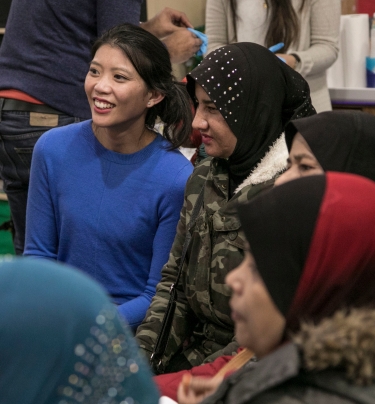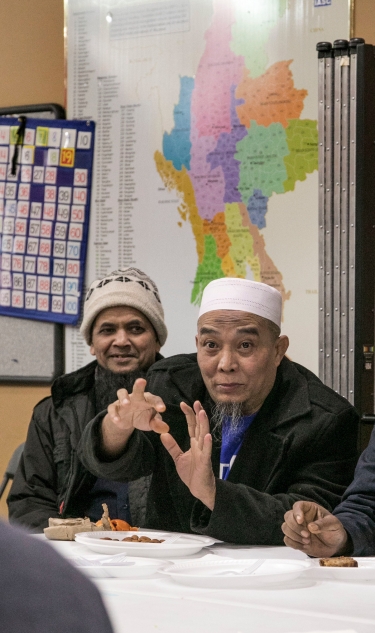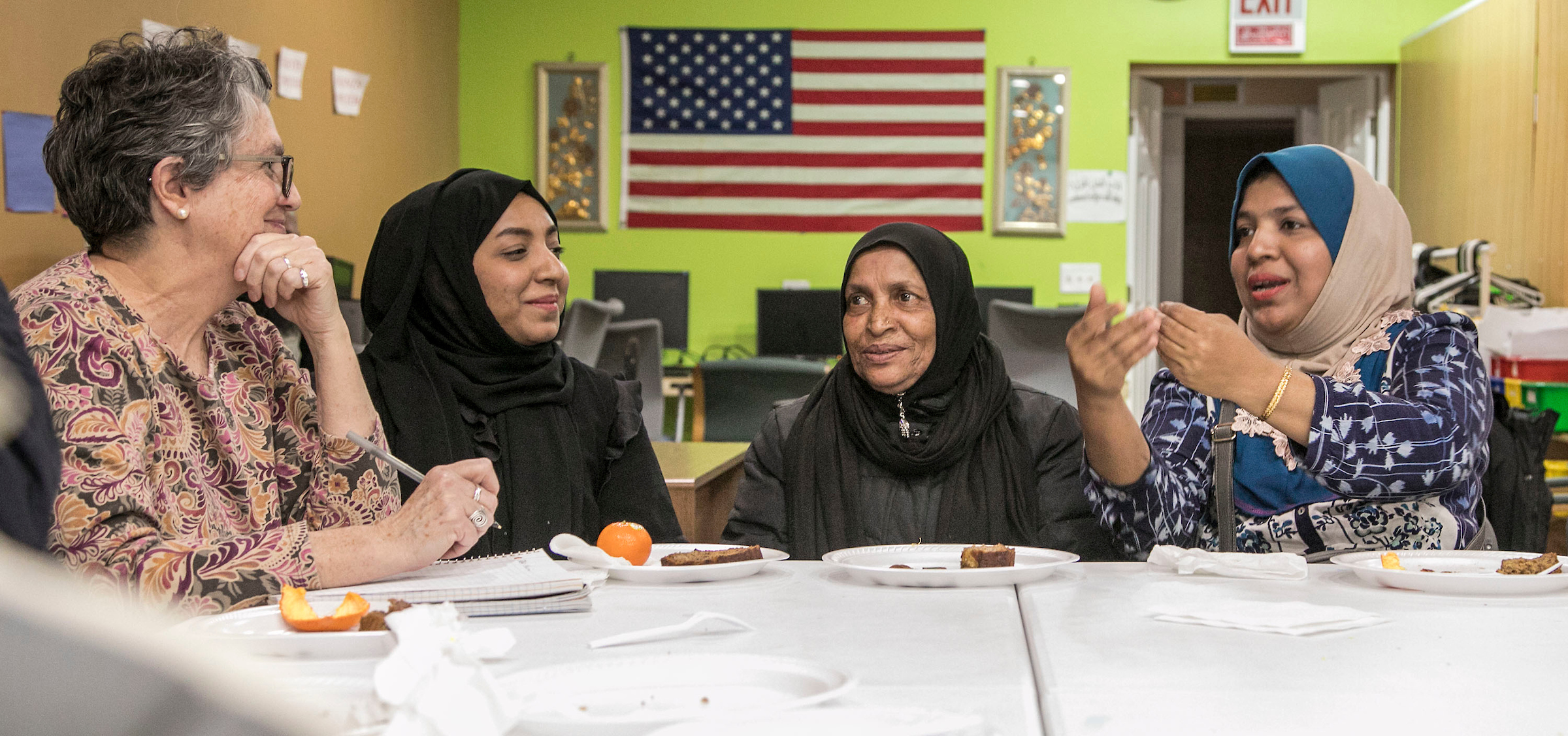 Anne Saw sits with Rosina, a Rohingya refugee, during a group meeting at the Rohingya Culture Center in Chicago's Rogers Park neighborhood. Saw helped convene the group to give refugees a place to "share and talk." (DePaul University/Jamie Moncrief)
Anne Saw sits with Rosina, a Rohingya refugee, during a group meeting at the Rohingya Culture Center in Chicago's Rogers Park neighborhood. Saw helped convene the group to give refugees a place to "share and talk." (DePaul University/Jamie Moncrief)Saw starts by showing up
On this particular day, Saw simply listens to the group, but there is much happening behind the scenes. She has earned grants from DePaul and from the Patient-Centered Research Outcomes Research Institute to direct community-based, participatory research. This means that the community will help drive the solutions for improving mental health among refugees, and researchers will start by listening and learning about the Rohingya culture and local community. For Saw, being present and getting to know individual refugees is central to her work.
"If you're studying a particular population or a community, you don't just show up and start the research. There's a lot of relationship building and trust building that has to happen," she says.
Many Rohingya refugees have experienced trauma while leaving their homeland, and they continue to face stress and worry for family and friends who are still seeking refuge. The community faces many structural issues, including poverty, racism and Islamophobia as a Muslim community, explains Saw, and standard approaches to addressing mental health issues will not work.
"The idea of psychotherapy or counseling services is something that's not consistent with the culture. So we have been taking the community's lead and figuring out what sort of services we can provide that are more culturally consistent," she says.
 Abdullah, a Rohingya refugee, speaks to the group about his experiences during a gathering at the Rohingya Culture Center. Psychologist Anne Saw is convening the group to help build capacity for addressing the community's mental health and other health needs. (DePaul University/Jamie Moncrief)
Abdullah, a Rohingya refugee, speaks to the group about his experiences during a gathering at the Rohingya Culture Center. Psychologist Anne Saw is convening the group to help build capacity for addressing the community's mental health and other health needs. (DePaul University/Jamie Moncrief)Saw created these group sessions to give refugees a space to share and talk. During a recent gathering, a woman shared that her first husband had died while being
imprisoned, and that she was worried for her mother back home. She spoke in Burmese, and her story was translated around the table, first to the Rohingya language and then into English, and several of the women began to tear up. Sometimes the telling of one story can take an hour, says Saw. But at the end, the woman reflected that she was "very glad to be able to share her story. She said that it made her feel better," Saw says.
"So hopefully we will get to a point where if they are experiencing stress or a lot of anxiety, any after-effects of trauma, this will be a space to provide counseling or strategies to cope with stress," Saw says.
Involving students in advocacy
At the same time, Saw is also leading an advocacy project, funded by a DePaul Academic Initiatives Program grant, which pairs Rohingya families with students who can champion the family's everyday needs and support the goals they set for themselves and their families. She is working with some 12 students from DePaul, the University of Illinois at Chicago, Loyola University, University of Chicago and the Erikson Institute.
"With my teaching at DePaul, what I most enjoy is helping students connect what they're learning to the real world, and to understand how theory and research applies to communities," Saw says. "I hope that they learn, too, that it's important for us not just to be respectful of people from different communities and cultures, but to really take value in different cultures."
Refugees face other complex needs, and Saw is consulting with other professionals and students who are offering services. She recently began supporting local pre-med students who set out to educate the community on diabetes self-management.
"I think of mental health and psychological wellbeing in a very holistic way," Saw says. "So if we're not addressing people's physical health needs, we're not doing all that we can to address their mental health or psychological wellbeing. If we're not helping them improve their English as they're trying to find jobs and work with their children's schools, we're not supporting their mental health or wellbeing. I see all of the work that we're doing as being in the service of improving wellbeing overall."
 Rohingya Culture Center staff member Laura Toffenetti listens as translator Sana Sultan and refugees Fatima and Nasima participate in a recent gathering at the center. (DePaul University/Jamie Moncrief)
Rohingya Culture Center staff member Laura Toffenetti listens as translator Sana Sultan and refugees Fatima and Nasima participate in a recent gathering at the center. (DePaul University/Jamie Moncrief)